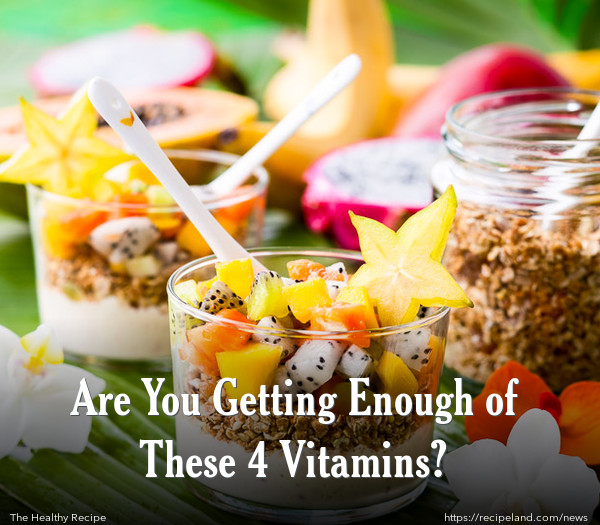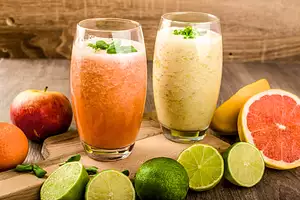A recent survey, the National Health and Nutrition Examination Survey (NHANES), assessed the health of adults in the United States, and evaluated their nutrition status. Findings revealed that approximately 10% of American adults have notable nutritional deficiencies.
Carolyn Brown, MS, RD, a dietician from New York City, stated, "The recommended daily values for vitamins are difficult to conceptualize when we're shopping for food and planning meals. It's not like I'm at the grocery store thinking, 'Let me pick up this kale so I get my recommended daily amount of vitamin K.” One thing that adds an additional complication to understanding nutritional requirements is that the amounts recommended for adults to consume daily (according to the USDA) are probably lower than they should actually be. In Canada, researchers have recommended that people consume 10 times more vitamin D than American recommendations suggest.
Here are four vitamins that are the most commonly low in the average diet, and suggestions for how to increase your intake:
1. Vitamin B6
Vitamin B6 is an important vitamin that helps the body produce serotonin and norepinephrine, which are important neurotransmitters that help the brain communicate with the body and nerve cells. This is a critical process for many body systems, such as the immune system and the metabolism. Those who are deficient in vitamin B6 may find that they have problems with nerves, skin, and circulation, as well as issues with memory loss, diabetes, asthma, ADHD, and even acne.
People who consume large amounts of alcohol are most likely to suffer from B6 deficiencies, as well as those with liver or kidney problems. An overactive thyroid can also lead to problems with B6. Vegetarian diets are often low in B6. The recommended amount of vitamin B6 for adults is 1.3 mg per day, for adults between the ages of 19-50 years. Older women need about 1.5 mg and older men need 1.7mg.
How to get more: To get more vitamin B6 in your diet, eat more legumes, carrots, spinach, peas, potatoes, milk, yoghurt, cheese, eggs, fish, liver, meat, fortified flour, and cereal grains.
2. Vitamin D
Vitamin D is also sometimes referred to as the “sunshine vitamin.” This is because vitamin D is produced in the body when the skin is exposed to sunshine. It is difficult to get vitamin D from food sources, and many people do not spend enough time outdoors to get the vitamin D that they need. It is estimated that more than 30% of adults and children in the United States have low levels of vitamin D. Vitamin D deficiencies are associated with an increased risk of cancer, increased depression, bone pain, muscle weakness and more.
Having proper levels of vitamin D can also boost your immune system. The official recommended amount of vitamin D per day is 600 IU for people between the ages of 1-70, and 800 IU for those over the age of 70. Many experts feel these levels are far too low, and recommend more vitamin D, between 1,000-6,000 IU per day.
How to get more: Add fatty fish (like salmon, mackerel, and tuna) to your diet. Eat more beef liver, cheese, egg yolks, and milk and orange juice that is fortified with vitamin D.
3. Vitamin C
Vitamin C is an important antioxidant that helps prevent cell mutations that are caused by too many free radicals in the system. Vitamin C is also important for healing, as well as the maintenance of body tissues, bones, and teeth. Vitamin C is thought to be very powerful for boosting the immune system, and for battling the common cold. Those who have high levels of vitamin C tend to have milder symptoms and recover more quickly.
Those deficient in Vitamin C will experience fatigue, muscle and joint pain, bruising, swollen gums, and poor healing. Chronically low vitamin C levels can lead to scurvy, which can be very serious. The recommended daily amounts of vitamin C are 75 mg for women, and 90 mg for men.
How to get more: To get more vitamin C in your diet, be sure to consume more citrus fruits, cantaloupe, mango, kiwi, papaya, pineapple, berries, broccoli, Brussels sprouts, spinach, leafy greens, sweet potatoes, and winter squash.
4. Vitamin B12
While all of the B vitamins are important for maintaining bodily health and good function of the systems, B12 is most important for metabolism, as well as the formation of red blood cells and DNA. It is an important ingredient for keeping the central nervous system working efficiently. Those who are deficient in vitamin B12 will find that they are more likely to suffer from mental health issues, such as depression and anxiety, as well as muscle weakness, stiffness, incontinence, low blood pressure and even vision problems.
Vegetarians and vegans are at a higher risk for vitamin B12 deficiencies, as B12 is commonly found in animal products. People over the age of 14 need at least 2.4 micrograms per day, while pregnant women need to consume 2.6 micrograms, and breastfeeding women need 2.8 micrograms per day.
How to get more: To get more vitamin B12 in your diet, be sure to eat more organ meats, shellfish, meat, poultry, eggs, milk, and other dairy products, as well as fortified breakfast cereals.
Getting enough of these important vitamins in your diet will help your body function more efficiently and lead to better health!










Comments